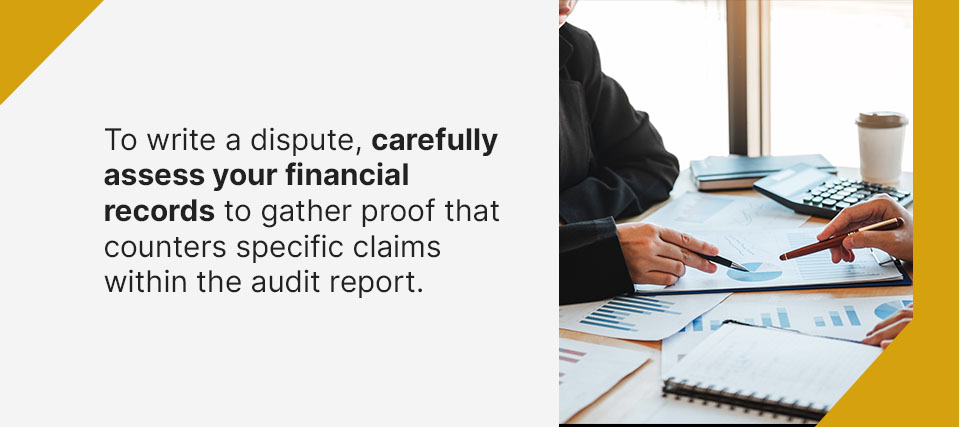
Everything You Need to Know About Financial Audits
Audit adjustments can significantly impact your organization’s financial statements. It’s essential to evaluate their regulatory compliance effects and determine potential internal control deficiencies that may prevent you from detecting misstatements.
Though many audit adjustments are common, there are various measures you can take to avoid these corrections and ultimately improve your internal operations.
What Are Audit Adjustments?
Audit adjustments are proposed corrections that outside auditors make for your company’s general ledger. These corrections come from financial misstatements, errors or items discovered during auditing procedures that may require revision or reclassification to different accounts. Your business must correct these issues before your auditors will sign off on the audit report.
Understanding Basic Audit Principles
The American Institute of Certified Public Accountants (AICPA) is a national professional organization that establishes auditing and ethical standards in the United States. The AICPA has developed a set of audit principles to guide auditors as they perform their duties:
- Training: All auditors must have the appropriate training to plan and execute the various audit types across all industries.
- Independence: Auditors must have no financial, relational or operational ties to whatever institution they’re auditing to avoid potential conflicts of interest, bias and approval without evidence.
- Due care: An auditor should possess the same level of skills and competence as their peers within the same industry and employment.
- Planning and supervision: Auditors must be involved in planning and supervising their work to provide an accurate, informed opinion of their findings.
- Understanding: Auditors must possess or gain a comprehensive understanding of the industry, the organization and its internal control processes to plan audit procedures for appropriate risks properly.
- Evidence: An auditor typically should ask for appropriate proof or documentation that supports the line item entries listed in the financial statements.
- Generally accepted accounting principles (GAAP) compliance: The auditor must verify that the organization is presenting its financial statements in accordance with the industry’s generally accepted accounting principles.
- GAAP exceptions: The audit report must identify instances where GAAP compliance does not exist.
- Disclosures: Auditors must verify that any information disclosed about the financial statement line items is adequate.
- Opinion: Auditors must provide an opinion based on their findings during the audit process. If they choose not to state an opinion, they must give their reasons for doing so.
- Confidentiality: Auditors must maintain confidentiality, as their clients entrust them with highly sensitive financial information. An auditor must seek the client’s permission before disclosing information to uninvolved parties.
Auditing Principles in Context
Some real-world examples of these auditing principles include:
- Honesty: Auditors must be transparent about their actions and discoveries. For example, auditors should not withhold vital information from their clients or issue their clients false information. An institution trusts its auditor to provide a true opinion of its financial data and relies on the auditor to disclose any valuable insights.
- Unbiased opinions: Auditors cannot allow their personal feelings and opinions to influence their decisions as they conduct audits. Maintaining an unbiased opinion may be challenging if the auditor has a personal or professional relationship with their client, as this is a conflict of interest. That’s why it’s crucial not to have any ties to the institution they are auditing. Remaining unbiased will enable an auditor to demonstrate their expert auditing skills and provide their client with an accurate opinion on their financial information.
- Evidence-based results: An auditor must be able to back up every line item with supporting documents, such as payroll reports, receipts and invoices. A thorough track record ensures that auditing results are accurate and allows the auditor to provide a true representation of the client’s financial information.
Why Do Businesses Get Audit Reports?

The purpose of a financial audit is to ensure the entity is not avoiding FICA or federal taxes. Some companies get audited because they over-report expenses, hide or under-report income, misclassify employees, or redeem ineligible deductions. Some other reasons why your business may get audited include:
- Your reported revenue is outside the industry norm: Revenue is a key focal point when evaluating your business’s financial statements and deciding whether to audit you. If your business diverges from the industry standard income, it is a red flag that may result in an audit.
- You are in the process of being acquired: If a company acquires your business, they will do a deep dive into your financials to ensure you handled your taxes correctly.
- You have previously been audited: After you have been audited once, auditors will check your business books to see if you have missed any taxation items. The process will continue until you organize your books. You can leverage an auditing service to help break the cycle.
- You are sharing articles of unprecedented growth: Press releases and articles about accelerated growth, acquisitions and additional investments can trigger audits. Auditors may investigate your financial statements to ensure you paid the necessary taxes and check for risks that can cause material misstatements in the financial statements.
- You made inaccurate statements regarding your registration: Your business must register for a tax license timely, and you must acquire sales tax licenses before your revenue exceeds your state’s parameters. Claiming your business started after the date that it did can result in an audit.
Common Audit Adjustments
Depending on their financial activities, companies encounter many common audit adjustments. These can range from verifying financial reporting accuracy to adjusting incorrectly classified accounts.
Some frequently occurring audit adjustments include:
Transactions and Events
In fast-paced environments, frequent transactions can lead to an increased risk of oversight. Some transactions may get recorded inaccurately or not at all. For example, financial statements may miss a liability that should have been recognized, or someone may record an asset with the wrong value.
These types of mistakes result in the auditor making necessary adjustments. So, recording every event or transaction in real time is essential to reduce the chances of errors.
Account Balances
Account balances are the most common adjustments. When discrepancies exist between the actual amounts and the records, an audit adjustment checks and confirms them.
For example, if a general ledger overvalues an asset, it requires a downward adjustment once an auditor’s review is complete.
An account balance adjustment could involve any form of general ledger account, including a liability account or asset account.
Revenue and Expenses
Inaccuracies in the financial statements relating to revenue and expenses are another common audit adjustment area.
These errors can distort your business’s financial standing and require adjustments to align the actual figures and records.
For example, premature recognition can lead to overstating revenue, or missing vendor invoices can result in understated expenses.
The Different Types of Audits
The first step when preparing for a company audit is to identify and understand which type of audit you are dealing with. Once you do this, you can take the necessary steps to prepare for the audit and incorporate the results into your daily operations. Here are the common types of audits:
- External audit: External audits are performed by independent auditors who have no stake in your company. They are ideal for businesses of any size that want to gain a clear view of their company and its processes without bias.
- Internal audit: An internal audit is an audit your company handles itself, checking that each branch of the company is following the proper procedures and internal policies. The goal of an internal audit is to strengthen the organization and identify areas for improvement.
- Forensic audit: A forensic audit is usually required at the court’s request, and its findings are used during legal proceedings to investigate fraud or misappropriation.
- Financial audit: A financial audit is conducted by external auditors who carefully analyze your company’s financial statements, processes and position. Because financial audits are typically annual audits, make sure you close out your company’s fiscal year before proceeding.
- Review financial statements: A review of financial statements is less expensive and smaller in scope than a full audit. It’s useful for analyzing financial information and checking for accountability, accuracy, and legality.
- Tax audit: The IRS conducts tax audits, which are among the most recognized types of government audits. Your company could experience a tax audit for several reasons, including noncompliance, or it could just be a scheduled event by the IRS.
- Agreed-upon procedures (AUP): An agreed-upon Procedure (AUP) is when a company hires an external auditor to audit a specific part of its business. Companies may initiate AUPs if a part of their organizational structure is not performing up to standards or they need to identify where they should allocate time or funds.
How to Prepare An Audit
If your business needs an audit, following the relevant measures helps ensure your finance department is compliant. Here are the typical steps that go into preparing for an audit:
1. Determine the Audit You Need

You will first need to decide what type of audit is necessary for your business. For example, a construction company would likely need a bonding or licensing audit.
Consider whether you need a balance sheet audit or a full audit.
Balance sheet audits examine your business’s assets, liabilities and equity in detail and compare them to previous periods. Auditors will investigate the reasons behind changes and verify the information’s accuracy and compliance with generally accepted accounting principles.
Full audits go a step beyond the balance sheet. During a full audit, your CPA will thoroughly dig into your financial picture. They will confirm income and its sources and verify operating expenses, sometimes in line-item detail. For example, an auditor may match accounts payable claims with the actual invoices your business received. After conducting a full audit, the CPA will issue an audit report stating their opinion on the information’s accuracy. These reports help boost confidence in a company’s financial condition.
Single audits are another option, especially if your organization is a nonprofit receiving government funding. During a single audit, the CPA has a narrower scope — the auditor focuses on accounting for a specific government award. They will investigate broader financial statements as part of their review to determine precisely how your organization managed the money you received from a government program. Its purpose is to confirm you followed any associated rules or restrictions for the money’s use.
2. Choose a Certified Public Account (CPA) Firm
Now that you know what type of audit your company requires, you should research CPA firms. It’s critical to find a reliable and trustworthy option to ensure you are getting the correct service from trusted professionals. Follow these steps to choose the best firm for your business:
- Ask about their specialty: In many cases, you can find a firm specializing in your industry, increasing the CPA’s likelihood of conducting a dependable audit.
- Check their history: CPAs receive licenses from their state, so you can research the accountancy board’s database. Doing so allows you to view essential information, including any disciplinary actions.
- Verify their memberships: Many CPAs belong to industry organizations, like the American Institute of Certified Public Accountants. These organizations promote integrity and ongoing education, so membership is a sign of your CPA’s values.
- Confirm their experience: While all CPAs have passed the required exams, there’s a benefit to working with an audit-experienced firm. Those who’ve served the industry longer generally have more in-depth knowledge of the process to make audits smoother.
- Check their fees: CPA firms may work on different fee structures based on the hours or complexity involved. Ensure you understand payment arrangements so you can compare costs between CPAs accurately.
- Confirm audit representation: If an IRS audit happens, you’ll likely want a skilled CPA in your corner. Reputable firms should offer audit defense to help represent you in dealings with the IRS.
- Ask people you trust: Referrals from friends, family and business advisors can help you identify the ideal CPA for your audit. Sometimes, they can also prevent you from engaging the wrong one.
3. Start Preparing for a Financial Statement Audit
The last step is to prepare for the audit. Communication is crucial, especially for loan covenant or federal spending requirement compliance. Make sure you know the best way to communicate with your CPA firm. That way, you can convey important information, such as when your audit’s deadline is, to ensure the firm conducts it correctly.
It’s also essential to start gathering important documents like the organization’s financial statements and plan for the time it takes to work with your auditor. That way, it’s easier and faster for them to complete your audit because you are ready to assist as necessary.
The documents needed for an audit will vary based on the audit type and scope and the structure of your business. Generally, you should expect to provide supporting evidence for your financial reporting.
Prepare for an audit with this internal audit checklist for the finance department:
- Gather expense evidence: Have receipts, paid tax statements and other evidence of business expenses available for your auditor. The auditor will align these with any allowable deductions to verify their existence and eligibility.
- Present income evidence: Ensure you have bank statements, deposit receipts and customer invoice copies to give your auditor. They’ll be able to confirm revenue claims and reconcile receipts with journal entries faster.
- Provide access to past third-party opinions and confirmations: Allow your auditor to review any previous objective opinions and audit reports. They can use these as supplemental resources to form a more comprehensive audit trail.
For privately held corporations, auditors may request additional documents that speak to financial health. These include:
- Cap tables representing your company’s ownership allocations to confirm value, expenses and the owner’s equity entry on your balance sheet.
- Form 409A to set forth the fair market value of outstanding stock and ensure you’ve valued equity-based compensation accurately.
- Other stock-based compensation reports detailing your valuation calculations.
How to Avoid Audit Adjustments
Though audit adjustments may seem unpreventable, there are ways to elude them. You can avoid even the most common audit adjustments by taking the following precautions:
- Perform self-audits: Frequent misstatements indicate that your company’s financial processes require remediation. Consider self-auditing any significant transactions, receipts, disbursements and potential variances to catch errors before they occur.
- Timely reconciliation: Regularly reconciling accounts is one of the best methods of avoiding common audit adjustments. It allows you to identify and correct any discrepancies between subsidiary accounts and the general ledger before the auditor reviews your financial statements. It also prevents minor errors from spiraling into more significant issues requiring audit adjustments.
- Review financial statements: Management should regularly review your company’s general ledger, cash receipts, cash disbursement journals and subsidiary ledgers to confirm that these balances are reconciled accurately. Frequent reviews are evidence of effective internal controls and timely corrections.
- Consultation and discussion: Understanding what procedures the auditor must perform and their objectives is essential when preparing for audits. Having the auditors and accounting team discuss and consult regularly can help mitigate any need for adjustments.
- Open communication: Being transparent makes it easier to align your company’s financial practices with the audit requirements. By helping each side understand the standards and expectations through collaboration, you can resolve issues and prevent them from leading to audit adjustments.
- Compliance with financial standards: Following relevant financial standards can significantly lower your chances of requiring audit adjustments. That means your financial reporting must comply with regulations. If you don’t, you could incur regulatory penalties and audit adjustments.
- Internal controls: Internal controls are mechanisms to accurately record all transactions, ensuring financial statements are free of discrepancies. They include manual oversight and automated checks, such as flagging unusual transactions and quickly reporting them. Regular internal audits can also strengthen the authenticity of your financial records.
- Monitor nonroutine transactions: It can be easy for nonroutine transactions to slip through the cracks, as these periodic activities are not typically part of your routine flow of transactions. Consider reviewing these transactions regularly to account for them.
Schedule Audit and Assurances Services at Marshall Jones
You can avoid audit adjustments with the help of the audit and assurance experts at Marshall Jones. We’ve spent over 35 years providing excellent client service to customers across Atlanta with exceptional technical competency and complete integrity.
Get in touch with us and let us help your company save time, refocus its resources, and improve its operations.


















